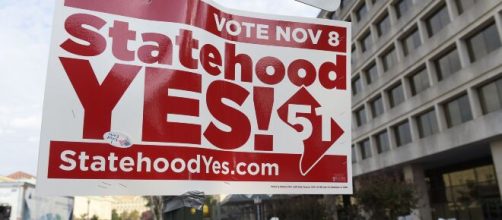Washington is currently the only city in the District of Columbia. In the past, there were two other cities included—Alexandria, which is now part of Virginia. And Georgetown, now within Maryland's borders.
Of course, Washington is the capital of the United States. It was purposefully left out of any one state, apparently in the hopes of avoiding preferential treatment for a particular state over any of the others. But this also means, somewhat ironically, the capital city wields less power in many aspects of American politics. Some are moving to try to change this.
Congress taking up a new vote on statehood
Congress is preparing to vote on a new bill regarding statehood for Washington, D.C. The House of Representatives is scheduled to vote next week, according to CNN. The move is expected to pass in the House easily.
From there, it would move on to the Senate, where the bill would likely be facing a much more uphill road. Senate Majority Leader Mitch McConnell, a Republican, is openly opposed to Washington, D.C. statehood. Even if it should make it through the Senate, President Donald Trump would not likely sign it into law.
Bloomberg indicates that this would be the first Congressional vote on statehood for the capital since 1993. That year, it was overwhelmingly defeated in the House of Representatives, never making it to the Senate.
Other bills proposing statehood for the city have been introduced many times since then. But they've never made it to the floor voting stages. A 2016 referendum held in Washington, D.C., showed massive support for statehood. Those in approval made up more than 85% of the votes cast.
The White House, Capitol building, Supreme Court building would remain separate from the potential new state. So would a few other monuments and federal buildings. The bill in question would also lead to a name change. Gone would be the District of Columbia. In its place would be Douglass Commonwealth, named after Frederick Douglass. Douglass was a noted abolitionist in the 1800s. He eventually became a diplomate during the administration of President Benjamin Harrison.
A different process than it would be for the territories
Washington, D.C. is being treated differently from U.S. territories in terms of becoming a state. Its capital status apparently makes it a unique case. Normally, other steps like a Constitutional amendment are necessary. This has caused some to question the legitimacy of the process.
The possible move towards statehood is also underway in Puerto Rico. Neither Washington, D.C. nor Puerto Rico currently have traditional Congressional representation. It's a similar story with the other territories. Each elects one member to represent its interests. But that member does not get to vote on the floor.
The District of Columbia does get to vote for president in the general election. It holds three electoral votes, which is the minimum that would be allotted to a state.


